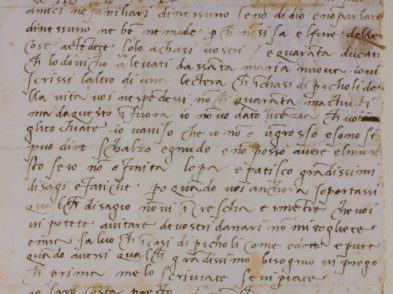Luca, a Florentine native, has not crossed the threshold of the Uffizi since his fourth-grade class stomped through its venerable halls, thinking of nothing but the pane e nutella their anxious mothers had prepared for their four o’clock snack on the Duomo steps. And yes, his last view inside the cupola was on that very same day. Still, he’ll recount Brunelleschi-based stories with learned accuracy and immeasurable satisfaction, for what Florentine does not take pleasure in tales of a hot-tempered genius who fed his workmen by hoisting kettles of hearty beef and peppercorn to the Cupola’s heights, along with the four million bricks it took to build it.
But, anecdotes aside, as an adult Luca has yet to experience the dwarfing pleasure of the master’s dome seen from inside the cathedral; he has never reveled in that upward-looking awe that makes your neck ache. I find this fact infuriating, but scolding comes to no avail: un fiorentino DOC seldom tours his home town. The Florentines own the place for heaven’s sake. Why, Dio buono, would they want to join ranks with what’s easily the ugliest race in the world: tourists. Oversized, underdressed, clumsy, hungry, lost, wonderstruck, worried-tourists are a dubious, albeit necessary, breed who cross the globe to seek out lines in which to stand and wait. He is suspicious of them.
To me, there is a shinier side of this coin: only a tourist can offer the world at a glance without ever having to leave your favorite side of the square. Stand in Florence’s piazza della Signoria, whose stones may well be magnets for the masses, and savor international idiosyncrasies like salty popcorn at an open-air cinema. Playing on home turf always gives Luca an unarguable advantage; his crowning talent is the often derogatory, occasionally affectionate ability to cram a millennium’s worth of cultural influences into a single comment.
To this point, he has often asked me what unknown genome makes Americans smile wide and wear white socks. The French he has no doubts about: they simply arrive in time for Mardi Gras to entertain themselves by being bothered with everything but the knee-high water flooding Venice’s piazza San Marco, a real annoyance that makes them inexplicably squeal in delight. Japanese crowds form peaceable configurations in front of Ghiberti’s Doors of Paradise; only the pigeons can translate the cooing noises they make.
About Italians he is no less merciful. According to Luca and Wilhelm Mühs (I know the first and had never before heard of the latter), Gli italiani si lamentano troppo, quindi, stanno bene. (‘Italians complain too much, which means they’re doing just fine.’)
‘Wilhelm Mühs is a German journalist,’ Luca informed me, as we sat at our people-watching post in piazza Santo Spirito.
With a name like ‘Wilhem’ the man’s nationality came as no shock. It was something else that surprised me: ‘You’re subscribing to the German take on Italians?’
He shrugged. ‘Mah. It’s possible the Germans know something we don’t. They lost two world wars and hardly let 50 years pass before becoming boss again.’
This is why I cultivate our friendship. Luca won’t deign to truly look at his native city, but he does see some things that totally escape my line of vision no matter how hard I stare.
Before our pausa was through, he was going to have to tell me what the Germans knew, and why, Roman Empire aside, the Italian peninsula has always been treated like conquerable territory. Were we forever to be considered amicable but slightly inferior Europeans, when sized up by the tape measures of international government?
‘Gli Italiani si danno da fare,’ my friend shrugged in answer to my queries. ‘We make an effort, but it’s not enough. To be boss you have to provide instructions, not opinions. And then, there’s the fact that, fondamentalmente, a noi piace dare aria ai denti. We like giving air to our teeth-to speak for the pure pleasure of it.’
Amen to that, brother. Italy’s idea of speech as entertainment is my prime reason for living in the country-or, at the very least, my main mechanism for surviving in it.
‘Italy has word power not world power,’ I joked.
He gave me a half-smile. ‘You say funny things.’
Hmm. The unexpected compliment endeared him to me and gave me sudden, surging hope, ‘Come inside the Duomo with me, would you?’
‘I can’t,’ he refused, ‘there’s a queue.’
‘Exactly. We may find Germans standing in it. We can ask them what they know.’
‘No.’
Damned fiorentino Doc. His birthright was enough. There was no need to claim it. Second-class citizen and contented king of the world.








